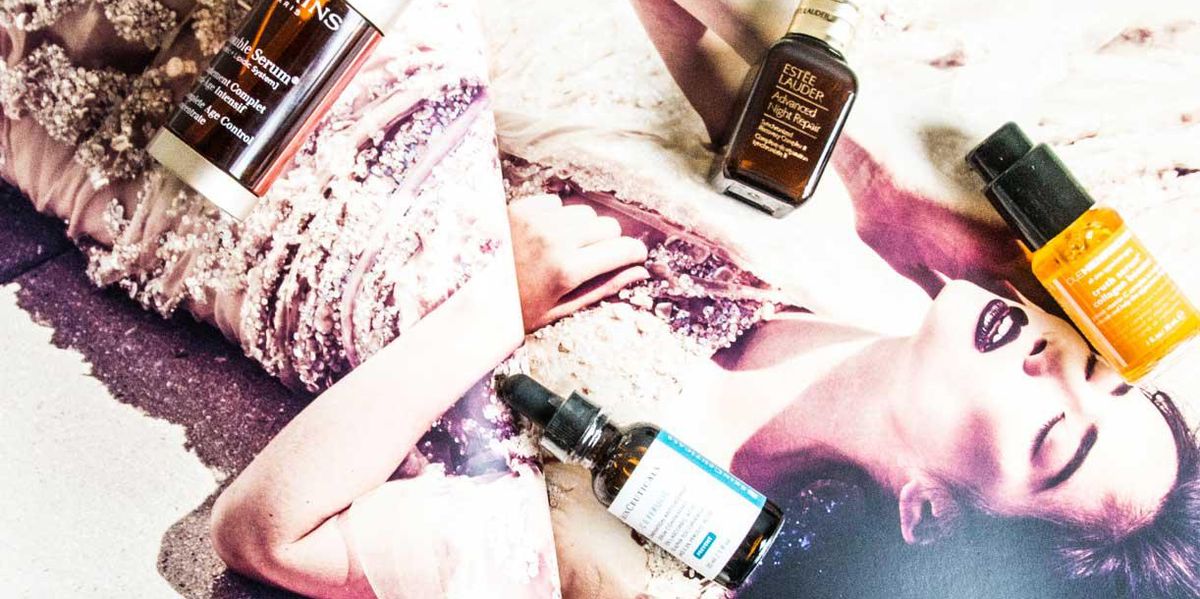
As a writer in the beauty industry I cannot begin to explain the importance of vitamin C in a proper skin-care regimen: it brightens hyperpigmentation, assists in the skin's collagen production, and (what we think is most this ingredient's most important attribute) it protects the skin from harmful free-radical damage. Unfortunately, the caveat here is that there are many people who are sensitive to vitamin C that is derived from ascorbic acid. So, does this mean that people with sensitive skin, acne-prone, or even mature skin cannot use vitamin C? Not at all.
Vitamin C serums come in all shapes and sizes, and are derived from different sources that can cause little to no damage on your skin. Dr. Joshua Zeichner, board-certified dermatologist and director of cosmetic and clinical research in dermatology at Mount Sinai Hospital explains, "Vitamin C comes in two main forms, pure ascorbic acid and ester forms. Pure vitamin C is water-soluble. It is more difficult to formulate and requires an acidic pH. It is unstable in UV light and commonly comes in dark or opaque bottles. I find it to be a bit more irritating to the skin, so I usually reserve it for people who are not sensitive. Vitamin C esters, on the other hand, are oil soluble. I find them more useful for people who are dry or sensitive. They are more stable in formulation and actually penetrate better into the skin." The stability of vitamin C serums derived from esters explains why you might see these serums in clear bottles, as opposed to the opaque or amber glass tinctures with which we are all familiar.
Dr. Zeichner continues, "If you're extremely sensitive, start [applying a vitamin C serum] every other morning—otherwise you can apply every day. Unlike ingredients like retinol, there is no adjustment period when it comes to vitamin C." Dr. Zeichner explains that it is more crucial to apply this ingredient in conjunction with a sunscreen to reap its benefits to the fullest.
So, which vitamin C serum is right for you? Ahead, a full breakdown of the ingredient, along with some products are most suitable for your skin type.
Sensitive skin
If you often find yourself patch testing products to no avail, Dr. Zeichner recommends vitamin C serums that are derived from vitamin C esters including, "THD ascorbate, sodium ascorbate phosphate, and others with the word 'ascorbate' in it."
Next Up Vitamin C Serum

Vitamin C Ester Brightening Serum

The Good C Vitamin C Serum

Acne-prone skin
Although you might be wary of applying anything to your breakouts that has a sensitivity controversy attached to it, vitamin C serum can actually help bring you to the end of your breakout woes. Dr. Zeichner explains, "There's data showing that vitamin C itself can help treat acne by reducing inflammation in the follicles. Vitamin C also helps brighten dark spots left behind after pimples resolve." The best forms of vitamin C for people with acne-prone skin come from sodium ascorbyl phosphate. However, Dr. Zeichner does explain that all forms of vitamin C generally work well with acne-prone skin.
Vitamin C Superserum

Silymarin CF

Hyper Clear Brightening Clearing Vitamin C Serum

Mature skin
Says Dr. Zeichner, "If you have mature skin, look for vitamin C products that are paired with vitamin E. They work together to protect the skin against the radical damage, making it useful for mature skin." Plus, vitamin E is an extremely moisturizing ingredient, meaning that while it's protecting your skin from free radicals, it's also plumping your texture to reduce the appearance of fine lines and wrinkles.
Bright Idea Serum

Vitamin C + E Complex

Kakadu C 20% Vitamin C Serum with Ferulic Acid & Vitamin E

Want more stories like this?
Juiced-Up Skin Care Is Going to Be Big for 2021—Here's What We Know
5 New Vitamin C Serums That Banish Dark Spots in No Time
Skin-Care Ingredients You Shouldn't Mix
0 Comments